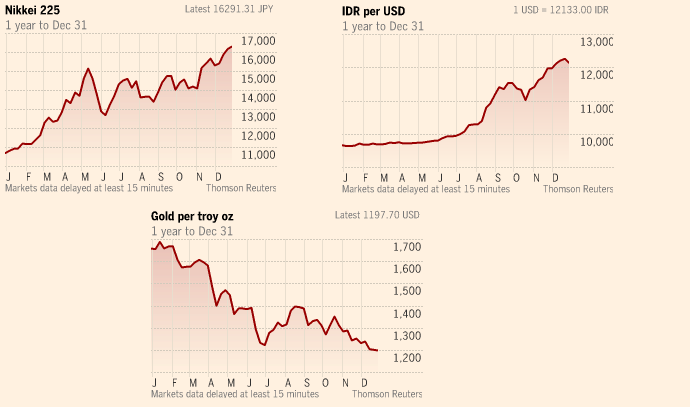Actualités
Stock markets bid farewell to record 2013
Internationale - Finance 31.12.2013

Tuesday, 10.05 GMT Major stock markets are ending the year at record highs, helped by record low interest rates from the world’s biggest central banks and a benign outlook for inflation.
The FTSE All World Index was looking at ending the year on a new high. It closed Monday’s session at 267.87, a record close, having made gains of nearly 20 per cent for the year – its biggest yearly advance since 2009.
Government bond prices, meanwhile, have dropped and yields have risen as investors sought higher returns on riskier assets. The Barclays Aggregate index – the bond market benchmark – has fallen nearly 2 per cent this year, its first annual drop since 1999.
US markets finished the penultimate session of 2013 flat, but the S&P 500 remained close to record levels, up 29 per cent over the year, while the Dow Jones Industrial Average is up 26 per cent.
In Europe, the FTSE Eurofirst, with one more trading session ahead of it, is nearly 16 per cent ahead on the year, while Germany’s Xetra Dax, which is closed today, finished the year up 26 per cent.
The Frankfurt index was the best performing of Europe’s major stock measures, but Bulgarian stocks rose more than 40 per cent, while the Ireland Stock Exchange rose 34 per cent. London’s FTSE 100, which is up 0.3 per cent at 6,748.73 on its last half session, has gained 14.4 per cent this year.
In Asia, Tokyo’s markets were shut on New Year’s eve, leaving volumes thin across much of the region. Japan’s Nikkei 225 index has already notched up a 57 per cent gain this year – its largest annual advance in four decades – to end at a six-year high of 16,291.13.
Among the region’s other indices, Australia had a tougher year as its predominance of mining stocks came under pressure as global commodity prices slipped. Sydney’s S&P/ASX 200, nevertheless, managed to climb 13.3 per cent over the year to 5,352.2.
Chinese stocks had an even tougher time as reforms, including property market rules, hit some of the country’s biggest sectors. The Shanghai Composite, which climbed 0.8 per cent to 2,115.05 on Tuesday, was down 7.1 per cent on the year. Hong Kong’s Hang Seng index inched up only 2.9 per cent in 2013.
As the summer approached the markets got their first warning that the Federal Reserve was to begin tapering its asset purchases. This had a major impact on markets in the region whose structural weaknesses meant they would feel the most pain from any reduction in capital flows into their markets.
Among the worst hit were Turkey and Brazil whose stock indices fell 18.3 per cent and 15.9 per cent respectively.
Currencies were also hit by the taper tantrum. Morgan Stanley identified in the summer a “fragile five” currencies whose structural imbalances made them unable to accumulate foreign reserves.
As well as the Turkish lira and the Brazilian real were the Indonesian rupiah, the Indian rupee and the South African rand. Both the rupiah and the rand are down by more than 20 per cent against the dollar, while the rupee is down 12 per cent, the real is down 15 per cent and the lira is down 18 per cent.
Among the major currencies, the euro gained on the dollar in spite of the US being the first to start removing monetary stimulus. The single currency trades at $1.3792, up 4.3 per cent on the year. Sterling is up only 2.2 per cent on the year at $1.6521.
The yen has been the biggest story – down 22 per cent over the year to Y104.96 after Japan’s administration, under the leadership of prime minister Shinzo Abe pursued policies to tackle longstanding deflation, including measures such as monetary expansion that weaken the yen.
Gold has been the standout mover on commodity markets after the high profile portfolio asset found nothing in the way of support this year as investors took to higher yielding, riskier assets. With inflation also remaining anchored, investors found little reason to hold the precious metal, and it is down 28 per cent this year to $1,199.75 an ounce.
Government bond markets have been similarly unloved as rising confidence in economic recovery have pushed both UK Gilt and US Treasury benchmark yields above 3 per cent.
The big winners in the fixed income market have been corporate issuers, who have found the low rate environment the perfect setting for fundraising through the capital markets.
Source: FT
------------
© 2011, MENA Capital Partners tous droits réservés. Les
informations et statistiques contenues dans ce document ont été préparées par
MCP sur la base de renseignements provenant de sources considérées comme
fiables. Malgré nos efforts pour mettre à disposition des informations
précises, leur conformité et leur exactitude ne peuvent être garanties. Cette
publication est destinée à l'information des investisseurs et ne constitue pas
une offre de vente ou d'achat de titres.

 Accès client
Accès client English
English









